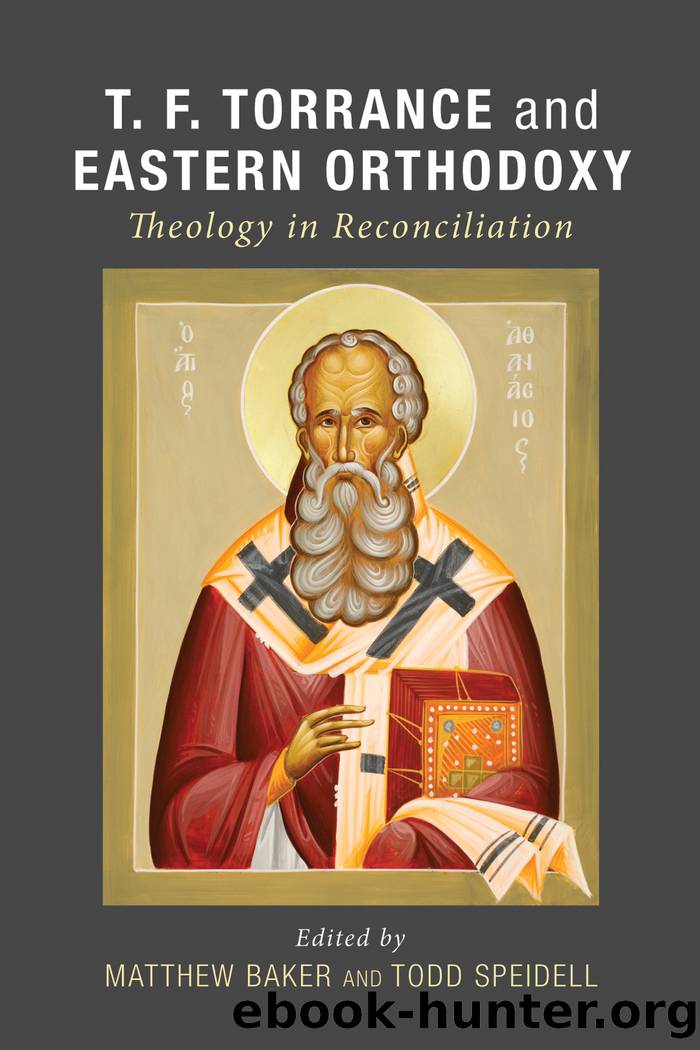T. F. Torrance and Eastern Orthodoxy by Baker Matthew;Speidell Todd;

Author:Baker, Matthew;Speidell, Todd; [Baker, Matthew]
Language: eng
Format: epub
ISBN: 9781498208147
Publisher: Wipf and Stock Publishers
Published: 2015-11-16T08:00:00+00:00
John Zizioulas is widely recognized as the most representative Orthodox theologian in recent times and an original, although in some respects controversial, spokesman of the Cappadocian legacy. In various ad hoc publications, Zizioulas highlights the importance of Cappadocia as a third â so to say, alternative â way17 of doing theology against the dominant discourse of Alexandria and Antioch.
It is noteworthy that Zizioulas, unlike Torrance, does not make use of the biblical narrative as his starting point. Instead, he draws his theological reasoning almost exclusively from the Cappadocian Fathers18 (especially Basil the Great and Gregory Nazianzen) of the late fourth century (and subsequently on the Creed of the Second Ecumenical Council and also Maximus the Confessor), while at the same time offering important exemplary lessons regarding how one might go beyond the merely historical study of texts to a more systematic one.19
If the recovery of the importance of the Cappadocian patristic theology was a major achievement of Zizioulas, his ontology of personhood seems to be the axis upon which he founds his whole theological argument. Since the beginning of his career Zizioulas has focused on the importance of the concept of personhood both as a conceptual tool for the conceptualization of the doctrine of the Trinity and as the very soteriological reality of Christian faith, the fulfillment of theosis. As he puts it, âthe concept of person with its absolute and ontological content was born historically from the endeavor of the Church to give ontological expression to its faith in the Triune God.â20 Highlighting the ârevolutionâ inherent in the Cappadocian identification of personhood (a relational concept) with hypostasis (an ontological concept), Zizioulas asserts that personhood, despite its dominant understanding as mask (prosopeion) in earlier ages, should be now conceived as an ontological concept, belonging to the very core of being.21
Zizioulas articulated his theology of personhood for the first time with reference to the Eucharistic context. He repeatedly argues that personhood is âan identity that stems from a relationship.â This does not mean, however, that person should be assimilated to an abstract relationality, like the âinâbetweenâ of Martin Buber or the modern âmetaxologyâ of W. Desmond,22 which then might acquire primordial ontological status along the lines of the essence or substance of ancient Greek and medieval philosophy, defined as a necessary entity. Rather, Zizioulas considers personhood as a relational, unique, and concrete identity having ontological priority over substance, a priority that bestows the person with absolute freedom and relationality. Communion and otherness are the fundamental aspects of the concept of personhood. Grounded in the Eucharistic experience of the Church, the Cappadocian Fathers elaborated an original Trinitarian theology of personhood which implies that âthe person rests in the fact that [it] represents two things simultaneously which are at first sight in contradiction: particularity and communion.â23 For Zizioulas, the person is in fact the soteriological outcome of the doctrine of the Trinity, the necessary concept for conceptualizing the divine-human communion in terms of freedom, love, constant relationship, and uniqueness.24
If for Torrance the fundamental
Download
This site does not store any files on its server. We only index and link to content provided by other sites. Please contact the content providers to delete copyright contents if any and email us, we'll remove relevant links or contents immediately.
Getting It, Then Getting Along by L. Reynolds Andiric(610)
Global Justice, Christology and Christian Ethics by Lisa Sowle Cahill(389)
Religion and Politics Beyond the Culture Wars : New Directions in a Divided America by Darren Dochuk(387)
Positive Psychology in Christian Perspective: Foundations, Concepts, and Applications by Charles Hackney(324)
Forgiveness and Christian Ethics by Unknown(310)
Douglas Hamp The First Six Days by Unknown(210)
Christian Martyrdom and Christian Violence by Matthew D. Lundberg;(205)
The Oxford Handbook of Greek and Roman Mythography by R. Scott Smith;Stephen M. Trzaskoma;(195)
Beyond Heaven and Earth by Gabriel Levy(188)
Insurgency, Counter-insurgency and Policing in Centre-West Mexico, 1926-1929 by Mark Lawrence(187)
God and Eros by Patterson Colin;Sweeney Conor;(187)
The Bloomsbury Reader in Christian-Muslim Relations, 600-1500 by David Thomas;(186)
The Horrors and Absurdities of Religion by Arthur Schopenhauer(183)
Autobiography, Volume 2: 1937-1960, Exile's Odyssey by Mircea Eliade(175)
Cult Trip by Anke Richter(172)
Witches: the history of a persecution by Nigel Cawthorne(171)
The Myth of Disenchantment by Jason A. Josephson-Storm(156)
An Introduction to Kierkegaard by Peter Vardy(154)
The Believer by Sarah Krasnostein(151)
